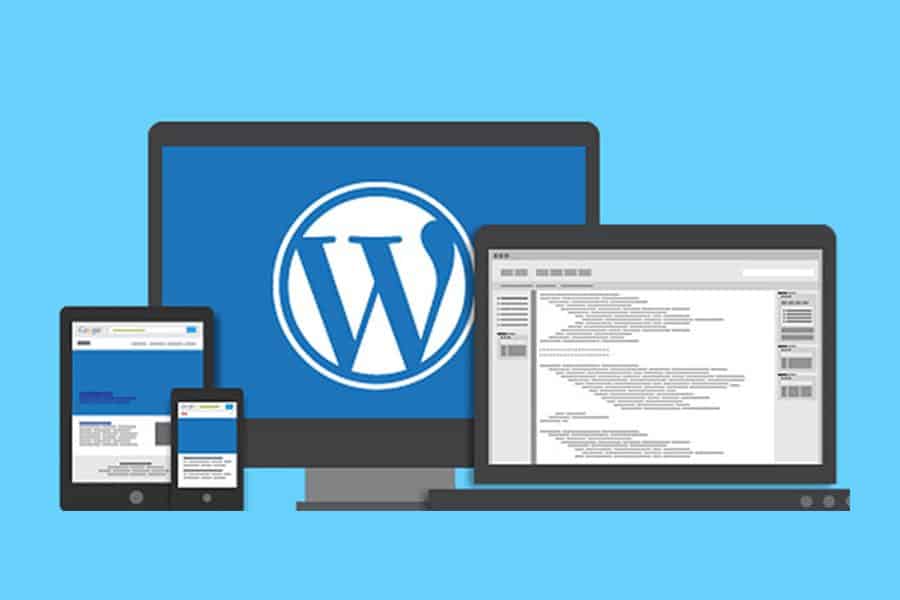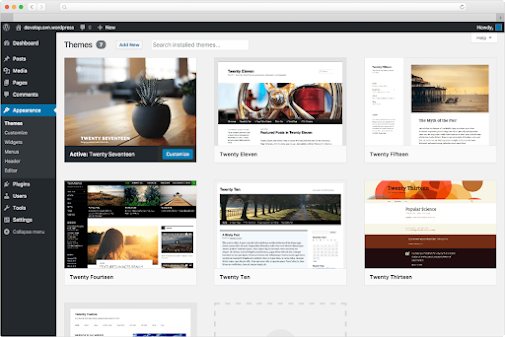What is WordPress?
WordPress is the simplest, most popular way to create your own website or blog. In fact, WordPress powers over 43.3% of all the websites on the Internet. Yes – more than one in four websites that you visit are likely powered by WordPress

What Kinds Of Websites Can WordPress Make
For example, not only does WordPress power a huge number of business sites and blogs, it’s also the most popular way to create an eCommerce store as well! With WordPress, you can create:
- Business websites
- eCommerce stores
- Blogs
- Portfolios
- Resumes
- Forums
- Social networks
- Membership sites
Who Made WordPress And How Long Has It Been Around?
WordPress was created as a standalone project all the way back in 2003, originating as an offshoot of a previous project called b2/cafelog.
WordPress is open-source software, so nowadays it’s made by a huge community of contributors. But if we were to trace WordPress’ origins back to its roots, its original creation was a collaboration between Matt Mullenweg and Mike Little.
Since then, Matt Mullenweg has largely become the face of WordPress. And he’s also the founder of Automattic, which is the company behind the for-profit WordPress.com service.
The history of WordPress between its founding as a blog platform back in 2003 and today is a long one…
But suffice it to say, WordPress has pushed forward and, thanks to its contributors and huge community, developed into the most popular solution to create any type of website.
Why Should You Use WordPress?
Ok, so over 43.3% of all the websites on the Internet are using WordPress, including well-known entities like the White House and Microsoft.
But what about you? Why should you use WordPress?
Well, no matter what type of website you want to create, there are plenty of reasons to use WordPress. Here are some of the biggest:
WordPress Is Easy To Install
Think you need to be a tech genius to create your own website? Think again! If you can click a few buttons, you can install WordPress on your site.
Nowadays, most web hosts either:
Offer to preinstall WordPress for you so that your site is ready to go right away.
Give you dedicated tools that make the install process very beginner-friendly.
Can I Install WordPress On My Personal Computer?
Absolutely! There are several good reasons why you might want to install WordPress on a local computer. You are building a new site from scratch, install a new theme or plugin or you just want a safe space to experiment with your existing website, without fear of breaking it.
So What Is WordPress? It’s The Best Way To Build A Website
WordPress is the most popular way to build a website for a reason. If you want to build any type of website, from a blog to an eCommerce store, WordPress is a great option.
Just remember that self-hosted WordPress.org and WordPress.com are not the same thing. And, in most situations, self-hosted WordPress.org is what you want to build a website. Self-hosted WordPress.org gives you more ownership as well as access to all the perks and benefits of the WordPress community.
So how will you use WordPress? We can’t wait to find out!
Save time, costs and maximize site performance with:
Instant help from WordPress hosting experts, 24/7.
Cloudflare Enterprise integration.
Global audience reach with 34 data centers worldwide.
Optimization with our built-in Application Performance Monitoring.
What Do You Use WordPress For?
Traditionally aimed at bloggers, these days you can manage all types of website with WordPress.
By default, WordPress includes posts and pages. Posts are intended for regular blog posts; pages are more useful as constant content, informational, rather than topical. While a website you might write in HTML and upload to a server would be referred to as "static," WordPress relies on a database to store and serve content. This is referred to as "dynamic."
While some plugins will add formatting options or help you to improve website performance, others can enhance or change how the WordPress site is used:
- If you wanted to set up an online store, you could install an ecommerce plugin like WooCommerce
- Podcasters might use a podcast management plugin like Simple Podcast Press
- Want to establish an online community? The bbPress forum software plugin is a good option
- Create a members-only website or zone on your blog with premium plugins like MemberPress
How Much Does It Cost to Use WordPress?
It is important to note the distinction between WordPress.org and Wordpress.com.
- WordPress.org hosts the downloadable version of WordPress. This can be installed to a web server hosted locally or online and is free to use, although a web host will charge a monthly subscription. Running your own WordPress installation lets you use any theme you like, install any compatible plugins, and use your own URL.
- WordPress.com is a hosting service owned by Automattic. It offers a free WordPress website that is preinstalled and ready to use. However, unless you pay for the service you cannot use it with your own URL. Furthermore, you're limited to approved themes and plugins.
So: you can use WordPress for free, but for full functionality, you'll need to arrange your own hosting.
It's Easy to Start a Website With WordPress
As you can see, WordPress is the de facto choice for online publishing. You can host it on a computer, a local server, or a web server. WordPress is capable of publishing blogs or static websites; it's free to use, or you can pay for hosting. Plenty of alternatives exist, there are "forks" of the WordPress code, and most websites that you visit use WordPress.


No comments:
Post a Comment